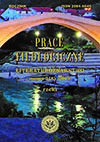The urban river in Dickens, Dostoevsky and Prus
The urban river in Dickens, Dostoevsky and Prus
Author(s): Aleksandra Budrewicz-BeratanSubject(s): Literary Texts
Published by: Wydział Polonistyki Uniwersytetu Warszawskiego
Keywords: miasto; śmierć; brud; geografia; rzeka; społeczeństwo; city; death; dirt; geography; river; society
Summary/Abstract: The article offers a comparative analysis of the literary presentations of three rivers (the Thames in London, the Neva in Petersburg, and the Wisła in Warsaw) in the following novels: Charles Dickens’s {Our Mutual Friend}, Fyodor Dostoevsky’s {Crime and Punishment}, and Bolesław Prus’s {The Doll}. The author discusses the presentations of these rivers and the ways the writers engaged river imagery with the cities. The rivers played crucial roles in shaping the plot and in the characterisation of the protagonists. The Thames serves a crucial part in {Our Mutual Friend}: it offers safety to some characters, but it is also a deadly power to others. The Neva and the Wisła are related to self- -exploration of the main characters who find it necessary to wander around the river banks; it is near the river bank when they undergo an internal transformation (Raskolnikov) or reflect upon humanity (Wokulski).Artykuł jest komparatystyczną analizą trzech literackich przedstawień rzeki w powieściach: Nasz wspólny przyjaciel Charlesa Dickensa, Zbrodnia i kara Fiodora Dostojewskiego i Lalka Bolesława Prusa. Elementem wspólnym w wymienionych tekstach jest udział Tamizy, Newy i Wisły w rozwoju fabuły analizowanych powieści i w strukturze urbanistycznej opisanych miast, a także ich funkcje metaforyczne. Tamiza jest kluczowym elementem Naszego wspólnego przyjaciela, życiodajną siłą dla jednych bohaterów i równocześnie śmiercią dla innych. W przypadku powieści Dostojewskiego i Prusa rzeki współkreują przestrzeń akcji, przyciągają nad swoje brzegi głównych bohaterów (S. Wokulskiego i R. Raskolnikowa). Umożliwiają czy też ułatwiają im doświadczanie stanów głębokich refleksji o ludzkości i dalszych możliwościach rozwoju i poprawy funkcjonowania miasta (Wokulski) oraz wewnętrzną przemianę (Raskolnikow).
Journal: Prace Filologiczne. Literaturoznawstwo [PFLIT]
- Issue Year: 2015
- Issue No: 5 (8)
- Page Range: 407-425
- Page Count: 19
- Language: English

